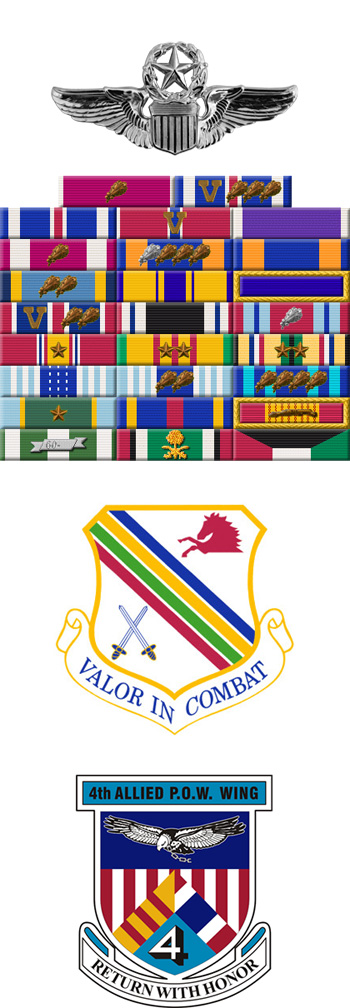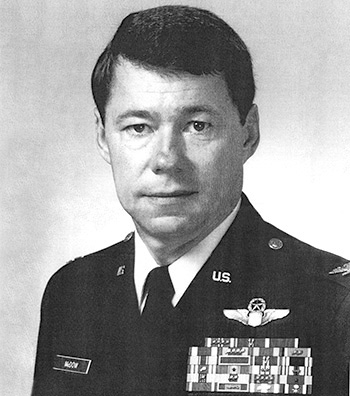
|
Richard H. McDow |
 |
|||
| Rank, Service | ||||
Colonel O-6, U.S. Air Force |
||||
| Veteran of: | ||||
|
||||
| Tribute: | ||||
Rick McDow was born in 1946 in Clanton, Alabama. He enlisted in the U.S. Air Force Reserve on December 15, 1969, and after completing his bachelor's degree at the University of Alabama, he entered Officer Training School at Lackland AFB, Texas, on February 19, 1970, and was commissioned a 2d Lt in the Air Force on May 18, 1970. Lt McDow next completed Undergraduate Navigator Training at Mather AFB, California, in May 1971, followed by F-4 Phantom II Combat Crew Training from May 1971 to January 1972. His first assignment was as an F-4 Weapons System Officer with the 390th Tactical Fighter Squadron at DaNang AB, South Vietnam, from January 1972 until he was forced to eject over North Vietnam and was taken as a Prisoner of War on June 27, 1972. After spending 275 days in captivity, Lt McDow was released during Operation Homecoming on March 28, 1973. He was briefly hospitalized to recover from his injuries at Maxwell AFB, Alabama, and then left active duty on July 6, 1973. Capt McDow returned to active duty on May 13, 1974, and completed Undergraduate Pilot Training and was awarded his pilot wings at Craig AFB, Alabama, in May 1975. After completing F-4 Combat Crew Training, he served as an F-4 pilot with the 78th Tactical Fighter Squadron at RAF Woodbridge, England, from May 1976 to July 1978, followed by service as an A-10 Thunderbolt II instructor pilot at Davis Monthan AFB, Arizona, from July 1978 to June 1979. Maj McDow next completed Fighter Weapons School at Nellis AFB, Nevada, from June to October 1979, and then served as an A-10 pilot, Weapons Officer for the 91st Tactical Fighter Squadron, and then Weapons Officer for the 81st Tactical Fighter Wing at RAF Bentwaters, England, from November 1979 to November 1982. His next assignment was as Chief of Wing Weapons with the 354th Tactical Fighter Wing at Myrtle Beach AFB, South Carolina, from November 1982 to August 1984, followed by Air Command and Staff College at Maxwell AFB, Alabama, from August 1984 to August 1985. Col McDow served as Operations Officer for the 511th Tactical Fighter Squadron and on the staff of the 81st Tactical Fighter Wing at RAF Bentwaters from August 1985 to June 1988, and then as Operations Officer for the 353rd Fighter Squadron, Commander of the 355th Fighter Squadron, and finally as Commander of the 354th Fighter Wing at Myrtle Beach AFB from June 1988 to September 1992. During this time, he deployed to Saudi Arabia in support of Operation Desert Shield from August 1990 to January 1991, and then flew 42 combat missions during Operation Desert Storm from January to March 1992. His final assignment was as Deputy Commander of the 363rd Tactical Fighter Group at Shaw AFB, South Carolina, from September 1992 until his retirement from the Air Force on September 1, 1994. |
||||
|
||||

